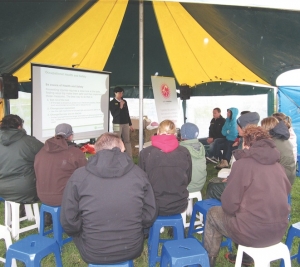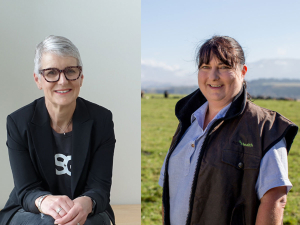They ran three pilot workshops in Waikato in October, just before a coroner released recommendations after looking into the deaths of five farmers in quad crashes. About 50 people attended the free events.
Tokoroa dairy farmer Sarah Manders, who owns and operates two dairy farms on 175ha, milking 400 cows, attended the Putaruru workshop.
Manders sometimes rides a motorbike but mostly a John Deere Gator ‘side-by-side’. Her husband taught her to drive the farm’s tractor.
“The farm vehicle safety workshop made me stop and think, and look more closely at little things I do every day that have become common practice. There were a few ‘aha’ moments when I realised I could improve my safety,” says Manders.
“This workshop would help farm workers, because hearing from experts about how serious it can be when things goes wrong, rather than the boss harping on, is also more effective. They’ll also participate in group discussion, valuable for sharing practical ideas and learning from other people.”
Putaruru farmer Lynley Mathis, who owns and operates a 180ha farm milking about 400 cows, also attended the workshop.
Being sole operators and with no staff to rely on, Mathis says she and her husband are acutely aware of the need to keep safe. Getting injured is out of the question.
She has a lot of experience of operating farm vehicles. “You get a bit blasé… so a reminder about the best and safest way to operate and handle your vehicles is always a good idea.”
“The videos John Deere’s product specialist showed us gave realistic examples of what can happen when your attention is distracted or you’ve entered ‘automatic mode’ because you do something so often; it doesn’t mean the dangers aren’t there.”
AGrowQuip chief operating officer Alan Cottington agrees with all the coroner about quads, particularly making training more accessible and adding more protection.
“Having a safe vehicle is only one part of the equation; knowing how to operate it properly is just as important but an instruction manual doesn’t build a practical skill set.
“When we were considering how we could contribute to improving the industry’s skill level in vehicle safety we approached the Dairy Women’s Network because they have a significant membership base and reputation. Things then progressed quickly to the pilot workshops.”
DWN executive chair Michelle Wilson says the network would like to see workshops annually nationwide. “Our members share what they learn with their families, onfarm teams and other rural people, so we have the ability to [help] thousands of people.
More workshops are planned for 2014. The training will include safety features of modern machinery such as transmission braking and anti-stall devices, driving in undulating and hilly terrain, safety shields and seat belts, basic maintenance, and rules for driving on roads.








